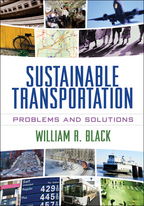Sustainable Transportation
Problems and Solutions
William R. Black
Hardcovere-bookprint + e-book
Hardcover
orderJanuary 4, 2010
ISBN 9781606234853
Price: $72.00299 Pages
Size: 7" x 10"
“Provides a succinct definition of sustainable transportation, identifies key problems of the current U.S. transportation system, and evaluates a set of possible solutions for more sustainable transportation in the United States. This book is most valuable for planners and policy makers who are not (yet) experts in transportation or as a textbook for an introductory transportation course for undergraduate students. Each chapter resembles an entertaining lecture consisting of an introduction, analysis, discussion, and conclusion.”

—Journal of Education and Research
“This is not only an excellent book, it is a wise book. Rather than providing a 'silver bullet' for the problems of sustainable transportation, Black clarifies the options in a dynamic and increasingly vulnerable world. He shows how policy can play a role, as can pricing, more travel options, and design solutions. The text provides a panoramic and historical view of the limits of sustainability, from the level of horse manure New York City streets could handle in 1900 to the amount of oil we can import today without risking national security and our climate. This is a book that students, educators, planners, placemakers, and reform advocates would do well to study and reflect upon.”

—David Burwell, founding chair, Transportation Research Board Committee on Transportation and Sustainability
“This book is a welcome addition to the evolving literature on how to put transport systems on a more sustainable pathway. Its coverage is vast—beyond widely discussed topics like climate change, energy depletion, and local air pollution, Sustainable Transportation also chronicles the societal costs of road fatalities, oil spills, and traffic jams. Technological, urban planning, and demand management approaches to solving such problems are critically reviewed. The book deserves a place on transportation professionals' bookshelves and in graduate courses in environmental and transportation planning.”

—Robert Cervero, Department of City and Regional Planning and Director, University of California Transportation Center, University of California, Berkeley
“This outstanding book should become a standard text for courses on transportation. The analytical message is clear and the coverage is excellent. Black has struck 'pay dirt' in the clarity of his delivery and in refocusing traditional approaches to transportation from a sustainability orientation. In an engaging and appealing style, the text directly addresses what today's professors and students want to know about the interface of transport, energy, environment, and policy. Students in geography, planning, sociology, public affairs, environmental science, and civil engineering would flock to a course organized around this text.”

—Kingsley E. Haynes, Dean and University Professor, School of Public Policy, George Mason University
“Black, true to form, has provided essential reading for anyone interested in sustainability challenges and solutions. This text is comprehensive in scope, accessibly written, and current. At times provocative, the book tackles issues as diverse as vehicle technology, full-cost pricing, and educating for change, and gives clear messages about the way forward.”

—Jean Andrey, Department of Geography and Environmental Management, University of Waterloo, Canada
—Journal of Education and Research
“This is not only an excellent book, it is a wise book. Rather than providing a 'silver bullet' for the problems of sustainable transportation, Black clarifies the options in a dynamic and increasingly vulnerable world. He shows how policy can play a role, as can pricing, more travel options, and design solutions. The text provides a panoramic and historical view of the limits of sustainability, from the level of horse manure New York City streets could handle in 1900 to the amount of oil we can import today without risking national security and our climate. This is a book that students, educators, planners, placemakers, and reform advocates would do well to study and reflect upon.”
—David Burwell, founding chair, Transportation Research Board Committee on Transportation and Sustainability
“This book is a welcome addition to the evolving literature on how to put transport systems on a more sustainable pathway. Its coverage is vast—beyond widely discussed topics like climate change, energy depletion, and local air pollution, Sustainable Transportation also chronicles the societal costs of road fatalities, oil spills, and traffic jams. Technological, urban planning, and demand management approaches to solving such problems are critically reviewed. The book deserves a place on transportation professionals' bookshelves and in graduate courses in environmental and transportation planning.”
—Robert Cervero, Department of City and Regional Planning and Director, University of California Transportation Center, University of California, Berkeley
“This outstanding book should become a standard text for courses on transportation. The analytical message is clear and the coverage is excellent. Black has struck 'pay dirt' in the clarity of his delivery and in refocusing traditional approaches to transportation from a sustainability orientation. In an engaging and appealing style, the text directly addresses what today's professors and students want to know about the interface of transport, energy, environment, and policy. Students in geography, planning, sociology, public affairs, environmental science, and civil engineering would flock to a course organized around this text.”
—Kingsley E. Haynes, Dean and University Professor, School of Public Policy, George Mason University
“Black, true to form, has provided essential reading for anyone interested in sustainability challenges and solutions. This text is comprehensive in scope, accessibly written, and current. At times provocative, the book tackles issues as diverse as vehicle technology, full-cost pricing, and educating for change, and gives clear messages about the way forward.”
—Jean Andrey, Department of Geography and Environmental Management, University of Waterloo, Canada



